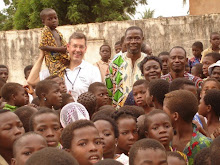Dr. Jean Pape is known internationally for his skill and knowledge regarding HIV disease in Haiti, and also his know-how in distributing antiretroviral medications in a country with no infrastructure. I had read about him several times in the New York Times. At a board meeting in Port-au-Prince we discussed a medical screening process for orphans. He would be our only hope to eventually work with AIDS orphans, which is definitely a priority – their situation is deplorable throughout the world.
As a side note, the medical screening process is in place so that we know the condition of our children, but not to screen out the medically “undesirable” ones. In fact, my Initial Report calls for the eventual placement of special needs children as ten percent of each project, including children with HIV or AIDS. But at this Haitian meeting in 2001, a vocal minority on the board was calling for all orphan applicants who tested positive turned away, as we could neither afford their upkeep nor allow them to be in proximity to our healthy children. While I agreed the financial burden was a cause for caution, I felt that it could be overcome. The second argument infuriated me because it reflected artificial fears that I thought had been overcome globally at least fifteen years before.
I still looked angry when I left the country. Sitting next to me at the airport, a clearly educated man asked me why I looked so cross. I told him it was a long story, to which he replied we had a long wait before boarding. He first wanted to know what I was doing in Haiti, and then why I was looking so upset. Well, I told him everything. He had asked, after all. And then he challenged me by asking what I would do about dealing with HIV-positive children.
I explained to him that I had heard of a Dr. Jean Pape and that I believe he would be the solution to my problem. “Ah! I have heard of Dr. Pape as well,” the man told me. “But I believe he is very busy. How will you ever be able to meet with him?” Well, I was still wound up, and to have a sympathetic ear seemed too good to be true. So I replied, “I would beg, borrow or steal to see him. I would move mountains to get to him. I would even lie to get into his office because I am convinced that if I were to meet Dr. Pape, he would understand my sincerity in wanting to help Haiti’s children and he would be helping me.”
With that, the man laughed heartily. Startled, I accepted his proffered business card. “I am Dr. Pape,” he laughed, “and I have never met someone like you. I would be happy to try to work with your organization if you are dealing with HIV-positive children.”
The second meeting was just as strange. I had written the Episcopal Bishop an email, and had tried calling him from both New York and Port-au-Prince to no avail. He either had never received my requests or he chose to ignore me, but I still was hoping to meet him. I was sure that he could help us in Haiti.
Crowding onto flights to Haiti ranks at the top of all travel hassles. With my backpack slung over my right shoulder and a large cup of coffee in my right hand, I attempted to push through the aisle to get to my seat. I remember wondering vaguely – if one can think at 7 a.m. boarding an international flight – why the man sitting in the seat next to mine was wearing a purple dress. Well, thoughts be damned, I had to get out of the aisle as old women wearing multiple hats were pushing past me.
As I slide into my seat my backpack slipped off my shoulder, hitting my forearm and jerking my hand so that I splattered coffee all over the man in the purple dress. My heart stopped, and I look at him as he replied not in anger but in love, “Faith – God bless you, my son.” My eyes were riveted on his hand, where he wore a large golden ring. Raised Episcopalian, a flash of realization went through my body like lightning: I had just poured my coffee over the Bishop of Haiti.
Well, he was a very forgiving man, and by the time we reached Port-au-Prince we were close friends. He introduced me from the pulpit as such the next day, and as coincidence would have it, he was preaching in Gonaives, the city where our orphanage is, and I was on hand to hear him speak. The OI Haiti director was shocked when we were invited up to the pulpit to explain our mission in Haiti, and he translated it into Creole. The Bishop embraced me and we had lunch together afterwards. Today our older children in Gonaives, who are all Christian, attend the Episcopal School there.

No comments:
Post a Comment